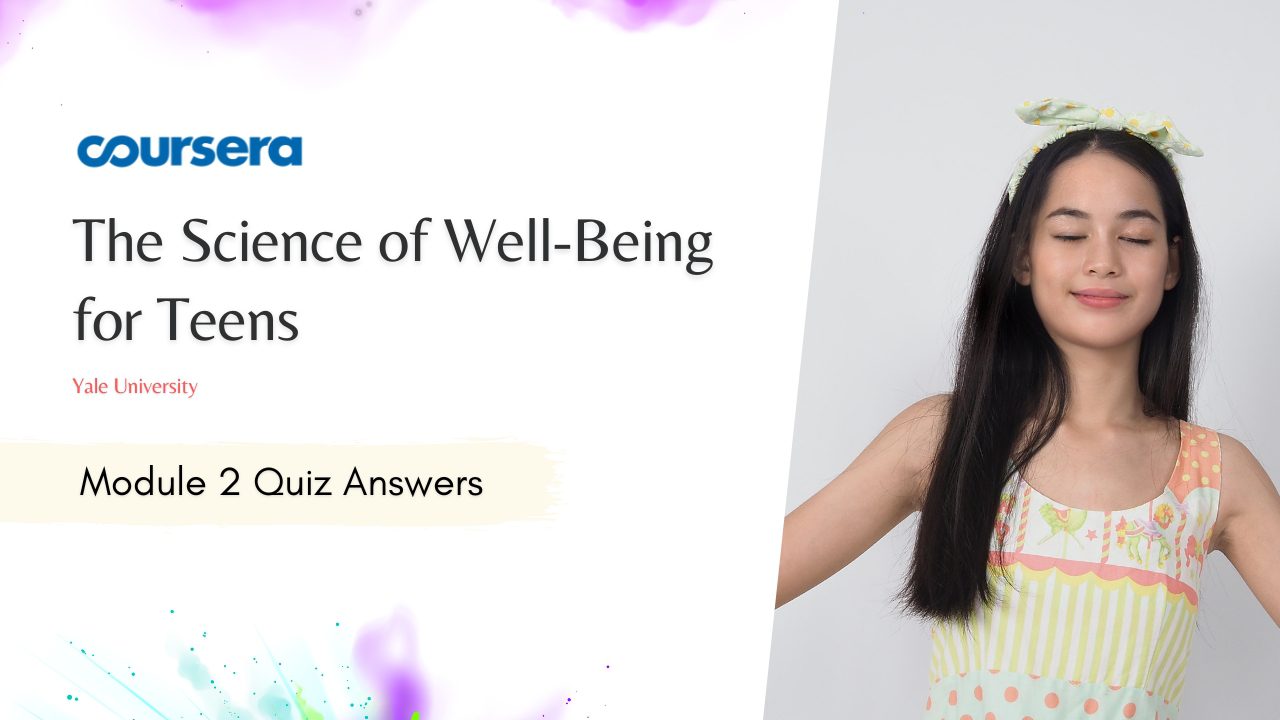Hello Friends in this article i am gone to share The Science of Well-Being for Teens by Yale University on Coursera | Module 2 Quiz Answers
The Science of Well-Being for Teens Module 2 Quiz Answers
Module 2 Quiz Answers
Question 1)
Imagine you get a bad grade on a test. Considering the studies shown in the lesson videos, which of the options below most closely aligns with the comparison of your PREDICTED emotions to your ACTUAL emotions.
- 😭 Super Sad (Predicted), 😐 Neutral (Actual)
- 😭 Super Sad (Predicted), 😭 Super Sad (Actual)
- 😐 Neutral (Predicted), 😭 Super Sad (Actual)
- 😐 Neutral (Predicted), 😐 Neutral (Actual)
Question 2)
Fill in the blank: Complete the definition of impact bias. The tendency to overestimate the emotional impact of a future event both in terms of its _____ and its ______.
- experience; duration
- intensity; duration
- intensity; experience
Question 3)
Which of the following is “a set of unconscious psychological mechanisms that help us to recover from bad events”?
- Focalism
- Psychological immune system
- Hedonic adaptation
Question 4)
You get into the National Honor Society (NHS) and are extremely happy. A few months later you are back to baseline happiness. What is this an example of?
- Psychological immune system
- Hedonic adaptation
- Affective forecasting
Question 5)
Based on what you learned about hedonic adaptation, which purchase would have a bigger positive impact on your well-being?
- A vacation to Universal Studios
- A new car
- The latest iPhone
Question 6)
Imagine you order chocolate cake for dessert. What would the act of slowly enjoying this dessert be called?
- Savoring
- Impact bias
- Hedonic adaptation
Question 7)
Your friend Rumi texts you that she’s kind of bored with her summer internship at her local newspaper. She worked so hard to get this job and was completely overjoyed when she got it. For the first four months or so she couldn’t stop raving about all the awesome opportunities. Now she’s not loving it. She is still doing all of the things she used to rave about, but they don’t excite her anymore. Based upon the principles we’ve discussed in this class, which of the following could help Rumi feel better about her job and life right now?
- Thinking about other people at newspaper whose jobs are super cool. This must mean her job is great, too!
- Finding another job.
- Thinking about what her life would have been like if she hadn’t gotten this job.
- Telling you all of the things she doesn’t love about her job to get them out of her system and move on.
Question 8)
True or False: A silver medal winner tends to be much happier than a bronze medal winner based on their reference points.
- False
- True
Question 9)
Select the correct definition for social comparison.
- An irrelevant standard.
- The act of evaluating one’s own salary/status/possessions/abilities/etc. relative to those of other people.
- Determining if the vibes are immaculate
- The act of evaluating one’s social behaviors in order to decide what to do next.
Question 10)
True or False: Social comparison usually helps us appreciate the material goods we own.
- True
- False
Question 11)
Which kind of attention requires more effort?
- Top-Down
- Bottom-up
Question 12)
Select the best definition for attentional hygiene.
- Using a variety of strategies such as brushing your teeth and flossing to have better hygiene.
- Using a variety of strategies to take control of your attention and minimize distraction.
- Using a variety of strategies to focus on your breathing when meditating.
Question 13)
What do the 3 W’s in Catherine Price’s WWW acronym for using social media more mindfully stand for?
- What do I do, why care, who else
- What to do, why do it, who else
- What for, why now, what else

